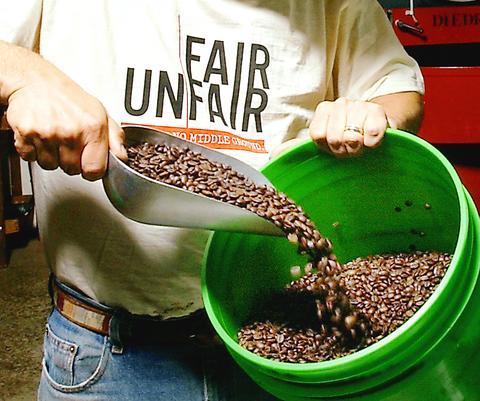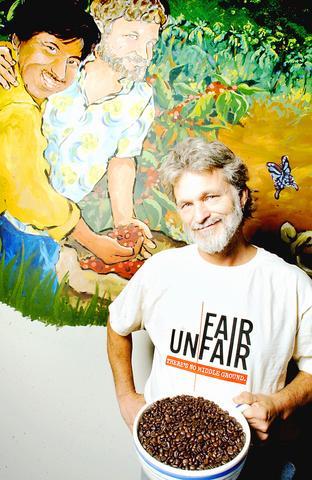In Dean Cycon's mind, the low prices that US coffee roasters pay to struggling farmers amount to a lot more than a hill of beans. That's why, from his small coffee company in the Central Massachusetts town of Orange, Cycon is roiling the trendy world of upscale coffee sellers with allegations of hypocrisy and exploitation of impoverished growers around the globe.
It's a fight in which Cycon's company, Dean's Beans, took out a full-page magazine ad that asked liberal icon Paul Newman, without consulting him, to pressure coffee roasters such as Vermont-based Green Mountain Coffee to buy more beans at higher "fair trade" prices.
The tactic prompted fiery responses from the Newman family, Green Mountain, and the "fair trade" organization TransFair USA, which asked Cycon to stop brewing trouble.

PHOTO: NY TIMES
"If this was a lifestyle choice about whether a farmer would buy a red truck or a dishwasher, it wouldn't be such an issue to me," said Cycon, who ran his controversial ad in the alternative magazine Arthur. "But when the price of coffee is not only below the cost of production, but inhibits the farmer's ability to feed his family, it becomes a very, very serious issue."
In Cycon's view, coffee roasters are taking advantage of one of the most depressed markets in the industry's history to make a financial killing. The worldwide market rate is about 60 US cents a pound, he said, alarmingly below the "fair trade" standard of US$1.26 per pound for conventional coffee beans and US$1.41 for organic. At the lower market price, Cycon said, farmers in Latin America, Africa, and Asia cannot hope to lift their families out of poverty.
TransFair USA launched its "fair trade" certification in 1999, and the organization expects to have 300 companies under contract by the end of the year, said Paul Rice, TransFair USA president and chief executive officer. Under the contract, TransFair puts its "fair trade" label on coffee that has been bought at the higher price from registered cooperatives of small farmers.

PHOTO: NY TIMES
Green Mountain, a publicly traded company that bought about 9 percent of its coffee at "fair trade" prices last year, cannot afford to make a sudden, full-bore switch to the higher rate without alarming its shareholders, company officials said.
"I think that the focus for current `fair trade' companies is, first, to grow their own sales, and, second, to try to urge those companies who are selling `fair trade' coffee to consider it and get on board and make a difference in these farming communities," said Rick Peyser, a spokesman for Green
Mountain.
In 1999, TransFair certified 840,000kg of coffee as "fair trade" brands, Rice said. By last year, the number was 4.2 million kilos.
In the coffee shop, the price difference between coffees bought at "fair trade" levels and those bought at much cheaper prices is not significant, said TransFair USA officials and Darby O'Brien, a spokesman for Dean's Beans. The difference, O'Brien said, lies in the profit margins.
"Corporations are only concerned with money," said Cycon, who estimated his company will do US$1.5 million in sales this year. "Although I acknowledge that's a perfectly worthwhile goal, it has to be balanced to true responsibility to all the people you work with."
To Rice of TransFair USA, the important number is a company's total "fair trade" purchases and not its percentage of such coffee. For example, he said, although Starbucks buys only 1 percent of its coffee at "fair trade" prices, that number translated into more than 420,000kg last year, Rice said.
"After five years of building the market, TransFair has succeeded in propelling fair trade into the consumer mainstream," Rice said. "And in doing so, we have essentially set up the foundation for benefiting literally hundreds of thousands of farmers at a time of the worst price crisis in the history of coffee."
To Nell Newman, Paul Newman's daughter, who sells coffee through Newman's Own Organics, which she cofounded, Cycon's view of the industry does not reflect the half-full picture she touts.
"There are different tactics," Newman said from her headquarters in Santa Cruz, California. "I'd rather just smile, set a good example, and sell a lot of `fair trade' coffee" with Green Mountain. Newman's Own Organics buys 100 percent of its beans at "fair trade" prices, said Newman, who stressed that her father does not have an ownership position in the company.
"I was peeved at Dean for using my father's name and image to catch people's attention," she said.
Although Paul Newman is not financially linked to his daughter's organic company, Nell Newman devotes all aftertax profits to charity, just as her father's food company does. But Newman's Own Organics hired Green Mountain to be its exclusive roaster and distributor, and therein lies the rub for Cycon.
"Newman's Own (Organics) is a welcome addition to the fair trade community," Cycon's ad said. "The problem is, Paul has come to our community through a partnership with Green Mountain Roasters ... a company that doesn't really practice the principles of fair trade."
Green Mountain officials adamantly defended their commitment to environmental and social justice principles, and said they are increasing the share of their "fair trade" market. The company, which did US$100 million in sales in the last fiscal year, intends to buy from 25 to 30 percent of its coffee beans at "fair trade" prices in five years, Peyser said.

The unexpected collapse of the recall campaigns is being viewed through many lenses, most of them skewed and self-absorbed. The international media unsurprisingly focuses on what they perceive as the message that Taiwanese voters were sending in the failure of the mass recall, especially to China, the US and to friendly Western nations. This made some sense prior to early last month. One of the main arguments used by recall campaigners for recalling Chinese Nationalist Party (KMT) lawmakers was that they were too pro-China, and by extension not to be trusted with defending the nation. Also by extension, that argument could be

Aug. 4 to Aug. 10 When Coca-Cola finally pushed its way into Taiwan’s market in 1968, it allegedly vowed to wipe out its major domestic rival Hey Song within five years. But Hey Song, which began as a manual operation in a family cow shed in 1925, had proven its resilience, surviving numerous setbacks — including the loss of autonomy and nearly all its assets due to the Japanese colonial government’s wartime economic policy. By the 1960s, Hey Song had risen to the top of Taiwan’s beverage industry. This success was driven not only by president Chang Wen-chi’s

Last week, on the heels of the recall election that turned out so badly for Taiwan, came the news that US President Donald Trump had blocked the transit of President William Lai (賴清德) through the US on his way to Latin America. A few days later the international media reported that in June a scheduled visit by Minister of National Defense Wellington Koo (顧立雄) for high level meetings was canceled by the US after China’s President Xi Jinping (習近平) asked Trump to curb US engagement with Taiwan during a June phone call. The cancellation of Lai’s transit was a gaudy

The centuries-old fiery Chinese spirit baijiu (白酒), long associated with business dinners, is being reshaped to appeal to younger generations as its makers adapt to changing times. Mostly distilled from sorghum, the clear but pungent liquor contains as much as 60 percent alcohol. It’s the usual choice for toasts of gan bei (乾杯), the Chinese expression for bottoms up, and raucous drinking games. “If you like to drink spirits and you’ve never had baijiu, it’s kind of like eating noodles but you’ve never had spaghetti,” said Jim Boyce, a Canadian writer and wine expert who founded World Baijiu Day a decade